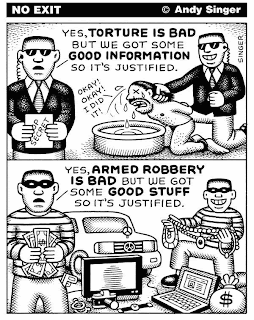I recently had a conversation about ethical, or moral, nihilism with a friend of mine. He called himself an “ethical nihilist” and a “mutualist anarchist”. I asked why he wished to end the state? Was it because of its monopoly on violence and use of coercion? His answer was yes, I then informed him that he couldn’t be an ethical nihilist because he took a ethical objection to the state. He said he was pragmatic, I asked if he would want to grasp the power of the state to meet his own objectives, if this was an idea he was comfortable with, he said no. I told him then that he wasn’t a pragmatist since pragmatism is, politically speaking, a statist view.
Ethical Nihilism also Moral Nihilism:
Since when is sociopathy a philosophical view? To believe that all human behavior is acceptable, that there is no right or wrong, means that rape, theft, murder, and oppression are equally acceptable as love, compassion, liberty, and generosity. I cannot think of a reason that you would oppose the state then since it is the embodiment of the former set of traits. On the contrary, many statists from both the right and left are ethical nihilists, if not moral relativists, no matter what they claim, and as such embrace the machinery of the state to further their own agendas. It is always under the guise of “the common good”, it’s mantra is “The ends justify the means!”. In other words, human beings are things to be used and discarded in order to reach ones goals.
This is why, throughout history, rebellions start with good intentions, however no matter how noble the beginnings most revolutionaries become what they originally rebelled against. The nature of violence and power are ultimately corrupting and those who participate find themselves eventually abandoning their principles. The ends can never justify the means as they are defined by them. Violence cannot lead to peace, theft cannot lead to prosperity, group hatred cannot lead to love and dehumanizing the enemy can’t lead to compassion. This is why believing that no behavior is immoral isn’t conducive to a civilized society, especially a stateless one.
I’m especially puzzled when I hear anarchists say they are ethical nihilists, it doesn’t seem compatible to me to advocate a stateless society and shun ethics. The only way for a stateless society to work is if it is grounded in natural law based on personal and common ethics. If you don’t believe in ethics it seems like a contradiction in thinking to call yourself an anarchist, as you must have some objection to the state based on some judgment you have made about it’s nature and necessity. To make such a judgment you have to have a basis, a reason you oppose it. In other words, you have found that it has no value. It takes a subjective code of values to come to that conclusion.
Only by semantic contortion can an ethical nihilist answer “why wouldn’t murder be acceptable in an anarchist society?” with statements such “it is undesirable”. What then makes murder undesirable if no human behavior is ethically wrong? For something to be desirable it must be deemed as wanted, if it is wanted it is seen as something that has value. In short we think that it is good, ergo we make all decisions based on our values and they inform both our feelings and our reason. Without meaning to people who claim no ethics must admit some type of value system in order to deem a behavior such as theft as undesirable, to stay coherent they would need to accept such behavior wholly without prevarication, which they don’t.
Maybe the problem is in the association, morality brings to mind religious tones that many people find disturbing. It is considered moral in some religions, and cultures, to sell your daughters into slavery or to shun your son if he is gay. However, ethics are not morals. Morals are more subjective than ethics as they encompass human behavior that isn’t necessarily harmful to others, such as gambling. Ethics are concerned more with behavior that is hurtful to others, such as theft. Morals and ethics do have overlap, but they are not synonymous with one another. Prostitution may be immoral, but there is nothing unethical about it, as no one is hurt. Whereas murder is both unethical and immoral. Morals can change from group to group and individual to individual, but ethics transcend, they are a part the natural law.
This is why I think the whole notion of ethical nihilism is based on reactionary thinking against religion and not a real philosophical position. If you embrace the view that all behavior is equal, no right or wrong, then there is no objection to the state you can make other than “I don’t like to be told what to do”. If that is your only argument, it’s not a logical or reasoned one. As a matter of fact, it isn’t an argument at all, it’s the temper tantrum of a small child. Anarchism will only succeed if people are willing to govern themselves and be voluntarily respectful of others rights. For that there must be a code of ethics and agreement to refute aggression and value human dignity as it’s core principles. I can see questioning morals, since the people who seem to talk the most about morals very often lack even common decency. Questioning ones values and morals is good, it leads to advancement, but refuting their existence altogether seems to me to be an abandonment of responsibility for one’s actions.
As for my friend, shortly after our conversation he took a philosophical fork in the road, he wrote “Death to ALL Capitalist Pigs!” (emphasis mine), I congratulated him for finally becoming an ethical nihilist. We are no longer friends.

